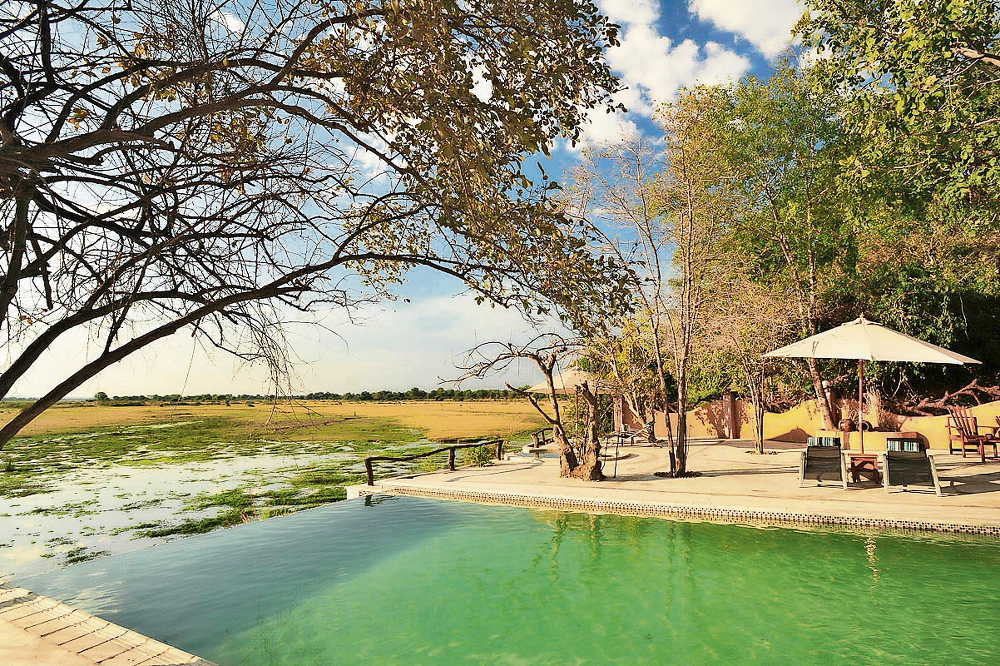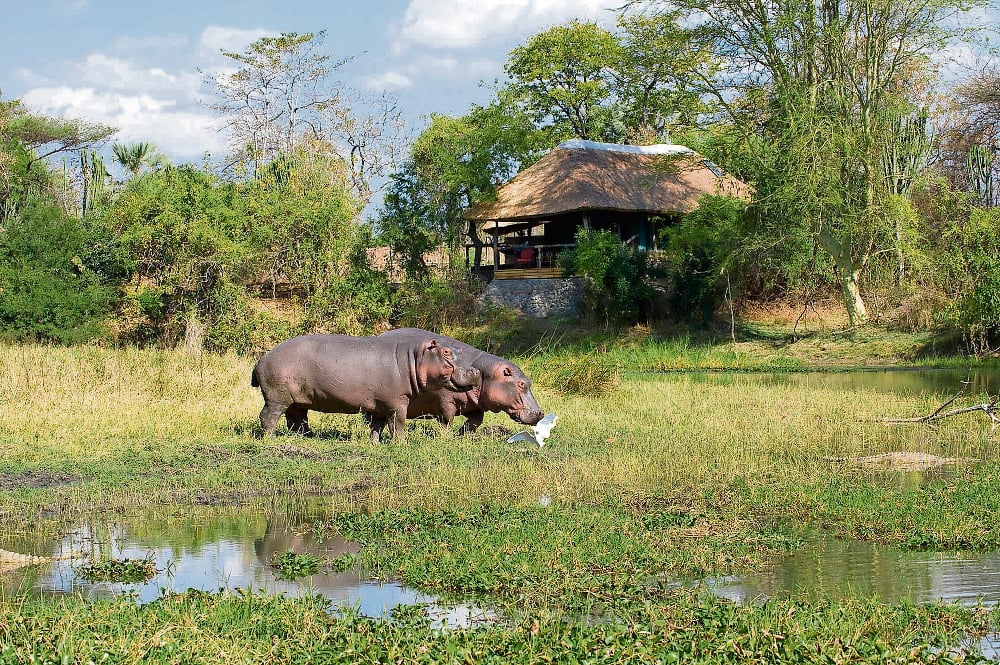The Mvuu Camp and Lodge in Malawi's Liwonde National Park.
Zambia’s South Luangwa National Park offers some of the best wildlife spotting in Africa, an attraction now complemented by several top-notch safari lodges.
You pay for how deep in the park you want to stay. Croc Valley Camp, the closest Luangwa gets to a budget option, overlooks the natural boundary of the Luangwa River, which in the dry season becomes a highway for elephants.
One even got stuck in Croc Valley’s swimming pool, but the thoughtful owners sanded down its edges to transform it into an elephant-friendly watering hole.
If this sounds intimate then the aptly named Wildlife Camp has a real feeling of nature taking over, with a much-needed guard employed to shoot a catapult at vervet monkeys who drop down on to the patio from overhanging trees.
Then there’s Kafunta River Lodge, a stunning residence on the big expanse of Luangwa’s flood plain. It feels suitably isolated at the end of a winding dirt track. Luxuryaccommodation comes in a string of huts with massive beds, billowing mosquito nets and private balconies.
An infinity-edge pool by the open dining area juts out over the plain; you can tread water with your chin over the edge and watch elephants step through clouds of dust in the distance. A herd of zebra went past during my visit, looking like one massive, long, shimmering animal in the heat.
Luangwa’s main draw card is the leopard, an animal I was hoping to get a glimpse of on a distant tree branch at best. We nearly ran over one on one of Kafunta’s game drives, the big cat having chosen the ridge of our tyre-worn path as a spot to eye up a herd of impala. It then nonchalantly slinked past the side of the Jeep, but our guide’s reassurance that leopards are quite harmless failed to loosen my white-knuckled grip on the seat in front.

The Kafunta Lodge.
Up close with the hippos
Kafunta Lodge has valuable proximity to a backdoor entry into the park, although the novelty of the main gate never wears thin; a road bridge crosses a wide section of the Luangwa River, full of the stepping-stone-like bodies of hippos. Particularly entertaining are the evening drives, when the air fills with their honking calls as you cross the bridge. Cue the standard “that’s what my husband sounds like in bed” gag.
Malawi’s Liwonde National Park is a less grand but equally memorable safari experience. Accommodation has been monopolised by Central African Wilderness Safaris’ Mvuu Camp and Lodge, a riverside complex whose isolation – both are only accessible by boat – make them extra-special. In the blink-and-you’ll-miss-it village of Ulongwe, youngsters on bicycles will offer to give you a 30-minute lift to the park through clusters of huts and crop fields.
Thick forest envelops the track from the park gate onwards and, a few kilometres in, it descends into mud at the river bank. I happened to stumble across John the ferryman during his lunch break (chicken in a pot boiling over a log fire), but he radioed Mvuu for the complimentary boat taxi nonetheless.
Mvuu Camp has 13 comfortable stone-and-canvas chalets under a thatched roof, five of which have been designed for families. The camp’s views of the Shire River seem great until you get to see those of its neighbour, Mvuu Lodge – its raised dining area is not so much by the river as on the river. The hippos are so close you could hit one with a well-aimed spit of a gourmet olive stone.

Hippos in front of the Mvuu Lodge.
An expensive but worthwhile walking expedition
From camp to lodge, the food is upgraded from a quality buffet to an outstanding three-course meal, and accommodation is now in luxury chalets with private balconies. Baboons and warthogs coexist peacefully in the grassy stretch below, while elephants noisily tear down the forest and occasionally plod down for a drink.
You’ll probably see more from your balcony than on a game drive, although a torchlight sighting of the quite hilarious elephant shrew, a proud member of Africa’s “small five”, seems to epitomise in true Liwonde spirit that less obvious is sometimes best.
Neither hippos nor crocodiles make it on to Africa’s “big five” wildlife list, but both possess a serous wow factor; in 10 years’ time, it’ll probably be Mvuu Lodge’s river safari that I’ll reach for at dinner parties for a wildlife-spotting anecdote, particularly the one about the low-swooping flock of flamingos that had everyone in the boat ducking as if on an air-raid drill.
That said, an expensive but worthwhile walking expedition into Liwonde’s black rhino sanctuary is something almost every other national park in Africa must be envious of.
Trips into South Luangwa can be made through Malawian Style, as the park is close to the Zambia-Malawi border; go to http://www.malawianstyle.com. Mvuu Lodge is available courtesy of Central African Wilderness Safaris; http://www.mvuulodge.com/